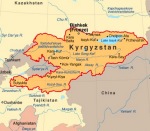
By F.William Engdahl
The remote Central Asian country of Kyrgyzstan is what Britain’s Halford Mackinder might call a geopolitical ‘pivot’—a land that, owing to its geographical characteristics, holds a pivotal position in Great Power rivalries.
Today the tiny remote country is being shaken by what appears to be an extremely well-planned popular uprising to topple US-backed president Kurmanbek Bakiyev. Preliminary analysts suggested that Moscow had more than a passing interest in promoting regime change there and that the events unfolding might be Moscow’s attempt to stage its own ‘reverse’ version of Washington’s ‘Color Revolutions’ — Georgia’s Rose Revolution of 2003 or Ukraine’s Orange Revolution in 2004, as well as the 2005 Tulip Revolution that brought the pro-US Bakiyev to power. In the midst of this ongoing power shift in Kyrgyzstan, however, who is doing what to whom, is far from clear.
Continue reading Part I: Kyrgyzstan as a Geolitical Pivot

